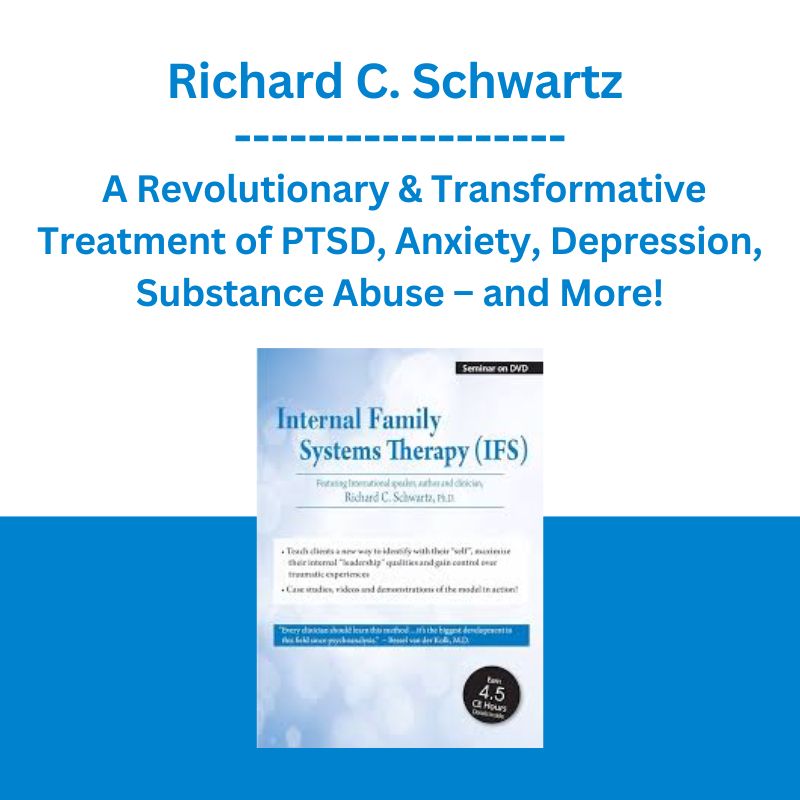*** Proof of Product ***
Exploring the Essential Features of “Richard C. Schwartz – Internal Family Systems Therapy (IFS): A Revolutionary & Transformative Treatment of PTSD, Anxiety, Depression, Substance Abuse – and More!”
- Learn the Internal Family skill-set from the Pioneering Therapist
- Take away the methods of IFS to help individuals, couples and families
- Teach clients a new way to identify with their “self”, maximize their internal “leadership” qualities and gain control over traumatic experiences
Dr. Schwartz’s presentation will provide a foundation in the Internal Family Systems (IFS) method and its use with attachment and trauma. IFS and its clinical applications will be demonstrated through a lively combination of lecture and discussion.
Developed over the past two decades, the IFS model is one of the fastest growing approaches to psychotherapy today. IFS offers both a conceptual umbrella under which a variety of practices and different approaches can be grounded and guided, and a set of original techniques for creating safety and fostering self-to-self connection in couples and families. Take home skills and tools that you can use in your practice and improve client outcomes.
Speaker
Richard Schwartz, PhD began his career as a family therapist and an academic at the University of Illinois at Chicago. There he discovered that family therapy alone did not achieve full symptom relief, and in asking patients why, he learned that they were plagued by what they called “parts.” These patients became his teachers as they described how their parts formed networks of inner relationship that resembled the families he had been working with. He also found that as they focused on and, thereby, separated from their parts, they would shift into a state characterized by qualities like curiosity, calm, confidence and compassion. He called that inner essence the Self and was amazed to find it even in severely diagnosed and traumatized patients. From these explorations, the Internal Family Systems (IFS) model was born in the early 1980s.
IFS is now evidence-based and has become a widely-used form of psychotherapy, particularly with trauma. It provides a non-pathologizing, optimistic, and empowering perspective and a practical and effective set of techniques for working with individuals, couples, families, and more recently, corporations and classrooms.
In 2013, Schwartz left the Chicago area and now lives in Brookline, MA where he is on the faculty of the Department of Psychiatry at Harvard Medical School.
Speaker Disclosures:
Financial: Dr. Richard Schwartz is the Founder and President of the IFS Institute. He maintains a private practice and has a employment relationship with Harvard Medical School. He receives royalties as a published author. Dr. Schwartz receives a speaking honorarium, recording, and book royalties from Psychotherapy Networker and PESI, Inc. He has no relevant financial relationships with ineligible organizations.
Non-financial: Dr. Richard Schwartz is a fellow of Meadows Behavioral Healthcare and is a member of the American Family Therapy Academy and the American Association for Marital and Family Therapy. He is a contributing editor for Family Therapy Networker. Dr. Schwartz serves on the editorial boards for the Journal of Feminist Family Therapy, the Contemporary Family Therapy, the Journal of Family Psychotherapy, and the Family Therapy Collections.
Target Audience
Counselors, Psychotherapists, Psychologists, Social Workers, Addiction Counselors, Case Managers, Marriage & Family Therapists, Nurses, Mental Health Professionals, Chaplains & Clergy
Objectives
- Explain the IFS Model and ways to integrate IFS into your clinical practice.
- Identify, specify and clarify the protective parts of clients with trauma histories to help with assessment and treatment planning.
- Summarize an alternate view of symptoms and psychopathology, showing how client’s parts are trying to protect them from emotional and psychological pain.
- Demonstrate IFS-specific grounding techniques for healing, anxiety, substance abuse and trauma.
Outline
Multiplicity & the Self
- Evolution of the IFS approach
- Multiplicity of the mind
- Stumbling on to the self
Internal Family System (IFS) with Trauma
- Protector parts and exiles
- IFS technique:
Honoring protectors
Dealing with the overwhelm
Witness and retrieve exiles
Unburden trauma memories, beliefs and emotions
Parts and Self of the Therapist
Therapist-client Relationship
Keys to Work Safely with Trauma Clients
Please see the full list of alternative group-buy courses available here: https://lunacourse.com/shop/









